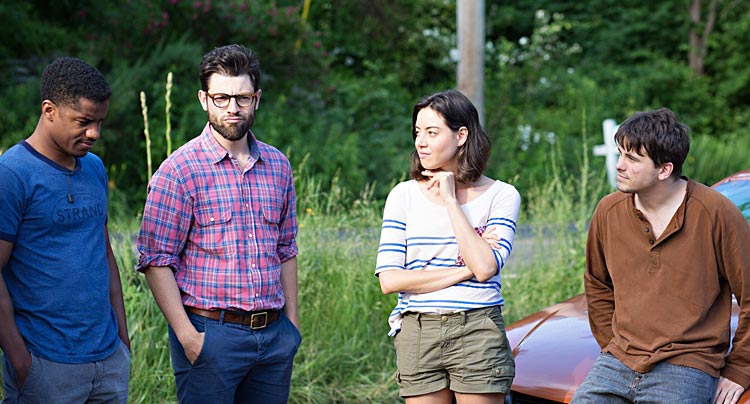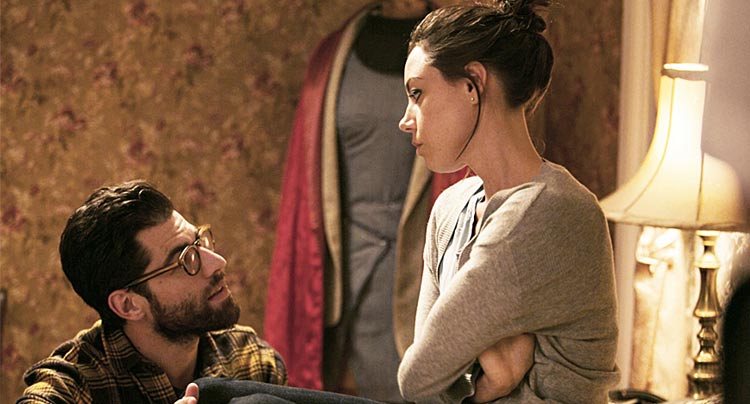
Falls into the traps associated with its indie dramedy subgenre.

Falls into the traps associated with its indie dramedy subgenre.
About Alex is very much a film of its time. For starters, the film is occasionally hyper-aware, in the Chris Miller-Phil Lord vein, of its architecture as a film imbued with tropes. The film also feels like a clichéd indie where characters gather together and reveal secrets and grievances. But what truly makes About Alex a film of its moment is its intense but clumsy interest in the way recent cultural changes such as the Internet and social media have altered relationships of Millennials.
As noted through casual meta-jokes, About Alex is essentially The Big Chill for a new era: a group of college friends spend a weekend together rehashing the past after one of their own attempts suicide. The meta-ness ends at the passing references to the film’s familiarity though (“This is like one of those ’80s movies,” one person says at one point). From there on out, About Alex falls into the traps associated with its subgenre. Jesse Zwick’s script (Zwick also directed) is laboriously constructed to the point where the summer home the gang goes to feels like it has more personality and well-worn history.
Alex (Jason Ritter) has fallen out of touch with his friends, and it has heightened his depression, causing him to attempt suicide. In a lifeless montage, his old friends receive the news. Journalist Ben has failed to write a book and dodging Alex’s calls. Ben is dating Siri (Maggie Grace; yes, there are, indeed, iPhone jokes made), who fears she might be late. Overworked lawyer Sarah (Aubrey Plaza) still can’t resist the douchey charms of brash PhD candidate and resident truth teller Josh (Max Greenfield, in the meatiest and funniest role). However, Sarah secretly still pines for straight shooting financier Isaac, who brings along a much younger plus one (Jane Levy) to the event.

This is a lot of information to set up but as overwrought as it is, Zwick does a good job of managing it fleetly and quickly. After its belabored introduction, the film settles into a more comfortable, but still far too affected, rhythm. About Alex feels worked over, and this strains its ability to feel natural and lived in. The conflicts are seen from a mile off, and they tend to resolve themselves exactly as one might expect them to – writer’s block ends, quarreling couples make up, etc. At a certain point, the revelations stop feeling like revelations and begin to feel like carefully doled out dramatic beats. As if what the film was trying to say were not spelled out clearly enough, Ben provides a voice-over in two separate instances to lay out the film’s themes and messages. The blandness and familiarity of the story is matched with a drab cinematographic scheme, shot by Andre Lascaris. Lascaris emphasizes muted, autumnal colors, which only adds to the film’s sense of lifelessness.
And yet, when the action lacks a feeling for spontaneity or the dialogue begins to sound too much like dialogue (as it all too often does), the film is saved by its likable, strong cast. The film gives the faintest impressions of why these individuals would have become friends and why they would enjoy one another’s company. In its best moments, the film nicely provides us with the desire to hang out with these people, to get drunk and stoned, and swap jokes and stories. A number of these actors have done some fine work in television (Plaza on Parks and Recreation, Greenfield on New Girl, Levy on Suburgatory) a medium far better suited to low-key hang outs where we learn to like and understand a large group of people. The performer’s easygoing chemistry and the general likability of all involved only gives a glimmer of why we should care. But the characterization and plotting is so thin and dull that it’s still hard to get invested.
There is promise and occasional kernels of wisdom buried in About Alex. But it’s lost in execution. As a Millennial, I have a larger stake in the cultural dialogue of my generation. The claims of solipsism lobbed at us will not be alleviated by a film like About Alex. These are narcissistic, selfish people who turn the well-being of one friend into an excuse to make everything all about themselves. Unlike The Big Chill’s characters, who had been out of college for many years, these characters are just a brief five years removed. Their nostalgia, crises, and bitterness feel a little too unearned. Unlike another Millennial-marked work, television series Girls — which is about the self-entitlement and delusion of people in their twenties — About Alex has no real interest in showing its characters’ actions and behaviors as wrong-footed or dissecting its characters to better understand their psychology.

At one point, in a terribly written scene, Josh tells everyone that his dissertation is on the way texts, emails, etc. are shaping our lives and will become biographical information for history. It’s the film’s clumsiest scene, revealing the gap between the film’s ambitions and what it actually accomplishing. At a number of points, About Alex notes the way we’re more connected and in touch due to social media but how that’s a poor substitute for actual social interaction and connection. It’s not a bad observation, it’s even one that would be interesting to explore further. But the film has such a poor handle on the inherent realities of this new media age that it feels glib and shallow.
However, the film is’t entirely shallow. For instance, when Zwick forces characters to confront Alex’s suicide, the film finds some emotionally authentic moments. When About Alex’s characters remember to not be characters in an indie dramedy, the slow dissolution of their friendships are relatable, if no less contrived.